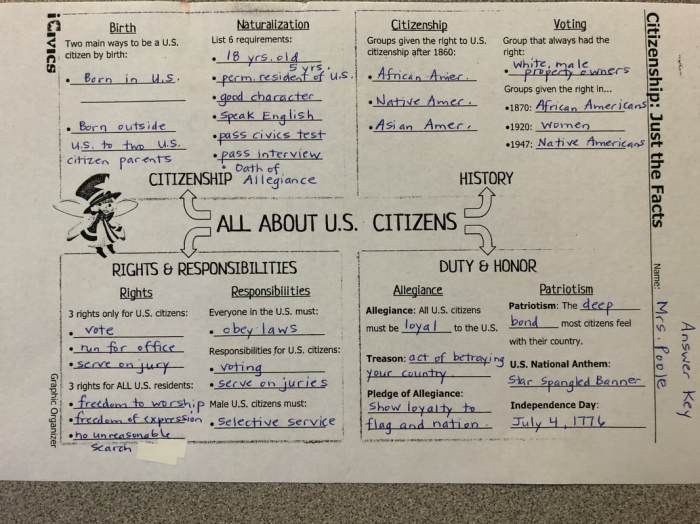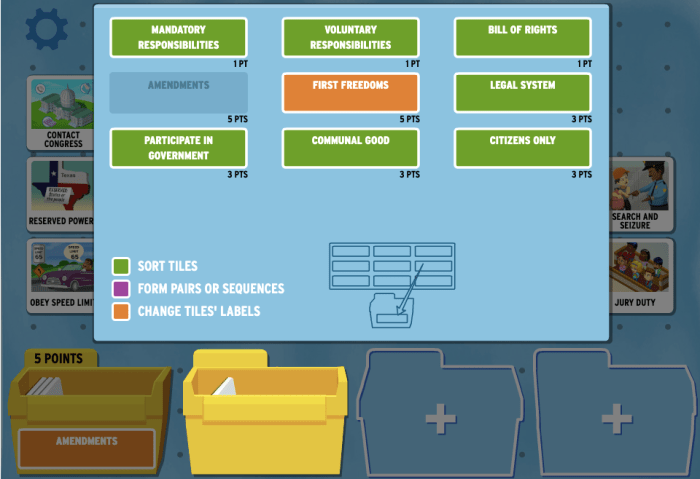Citizenship just the facts icivics answer key – Welcome to the definitive guide on citizenship, where we delve into the intricacies of rights, responsibilities, and the path to becoming a citizen. This comprehensive resource, “Citizenship Just the Facts,” will illuminate the complexities of this multifaceted concept, empowering you with a profound understanding of its significance for individuals and society alike.
Throughout this exploration, we will dissect the various types of citizenship, unravel the historical evolution of this concept, and examine the contemporary debates that shape its landscape. Prepare to embark on an intellectual journey that will broaden your perspective on citizenship and its profound implications.
Definition of Citizenship: Citizenship Just The Facts Icivics Answer Key

Citizenship refers to the legal status of an individual who is recognized as a member of a particular country or state. It entails a set of rights, responsibilities, and privileges granted to individuals based on their membership in that political community.
Rights and Responsibilities of Citizens
Citizenship bestows certain fundamental rights upon individuals, including the right to vote, hold public office, and receive protection from the government. It also entails responsibilities, such as paying taxes, obeying laws, and serving on juries.
Different Types of Citizenship, Citizenship just the facts icivics answer key
- Birthright citizenship:Granted to individuals born in a particular country, regardless of their parents’ citizenship.
- Naturalization citizenship:Acquired by foreign-born individuals who meet certain requirements and complete a naturalization process.
- Dual citizenship:Possessed by individuals who hold citizenship in two or more countries.
Importance of Citizenship
Citizenship plays a vital role in fostering a sense of belonging, identity, and community among individuals. It provides access to essential services, such as education, healthcare, and social security, and empowers individuals to participate actively in the political and social life of their country.
Process of Becoming a Citizen
The process of naturalization typically involves meeting residency requirements, passing a citizenship test, and demonstrating good moral character. The specific requirements and timelines vary depending on the country.
Challenges and Barriers to Citizenship
- Legal barriers:Strict eligibility criteria, lengthy processing times, and complex application procedures.
- Socioeconomic barriers:Limited access to resources, such as legal assistance and language classes, for marginalized communities.
- Political barriers:Restrictive immigration policies, anti-immigrant sentiments, and xenophobia.
Historical Perspectives on Citizenship
The concept of citizenship has evolved over time, from its origins in ancient Greece and Rome to the modern understanding of inclusive and participatory citizenship.
Comparative Analysis of Citizenship Laws
Citizenship laws vary across countries, reflecting differences in history, culture, and political systems. Comparisons can highlight similarities and variations in eligibility criteria, rights, and responsibilities.
Current Issues and Debates in Citizenship
Contemporary debates surround issues such as immigration, the expansion of citizenship rights, and the challenges faced by stateless individuals. These debates highlight the ongoing evolution and complexities of citizenship.
FAQ Compilation
What are the fundamental rights granted to citizens?
Citizens enjoy fundamental rights such as freedom of speech, assembly, religion, and the right to vote and hold public office.
What are the responsibilities that come with citizenship?
Citizens have responsibilities such as obeying the law, paying taxes, and serving on juries.
What is the difference between birthright citizenship and naturalization?
Birthright citizenship is granted to individuals born in a particular country, while naturalization is the process by which foreign-born individuals can become citizens.


